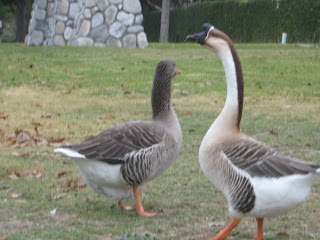We have had a second day here of heavy rain with more rainy days ahead . Something interesting we have found about California weather is that it seems to do whatever it is going to do in a big way. When the sun comes out, especially in the afternoon, it is hot and very intense. And when it rains it pours, flooding roads and creating puddles big enough to lose your car in. And those puddles are slow to soak into the ground. Maybe it is just that it does not rain much here, so the attitude is that one need not worry about gutters on the houses or drainage ditches for the roads. A big source of concern right now is for the homes located in the hills of Los Angeles. Three years of drought plus lots of forest fires is the perfect set-up for mud slides during heavy rains. There was one area of homes evacuated yesterday, those people have returned to their homes by now. The worse of the storms is coming tomorrow. Guess this is what winter is like for southern California. Fortunately for us, between showers, we can get out and walk in Scherer Park. It is a local city park with a small lake and lots of strange looking ducks and geese. I questioned one man (who seems to feel it is his mission daily to feed these water fowl) as to why there are so many unusual ducks and geese in this park. He opined that some of them have just been dropped off by people who were raising them, and others came in from the nearby hills to escape forest fires. I thought the muscovy duck to be very strange with pinkish-red caruncles which extend down his face from his eye to his bill. Most of the ducks and geese are together in pairs or in groups of three to four. This duck was a loner, possibly because he was very aggressive with the other birds. My informant said he thought he was of that nature because of his missus who was sitting on a nest of eggs.
Another unusual species in this park is the crested duck. The only pair are always seen together.
There is also a small flock of Chinese geese which I have pictured below. The male of the species has a large black swelling or basal knob on his forehead.
We have also noticed snowy egret, cormorants, coots, mallards and snow geese hanging around this pond. They bring many people to the park mainly during the early hours of the day and again in the late afternoon when children get out of school. I do believe these birds are existing mainly on a diet of bread crumbs!
Tuesday, January 19, 2010
Subscribe to:
Post Comments (Atom)



No comments:
Post a Comment